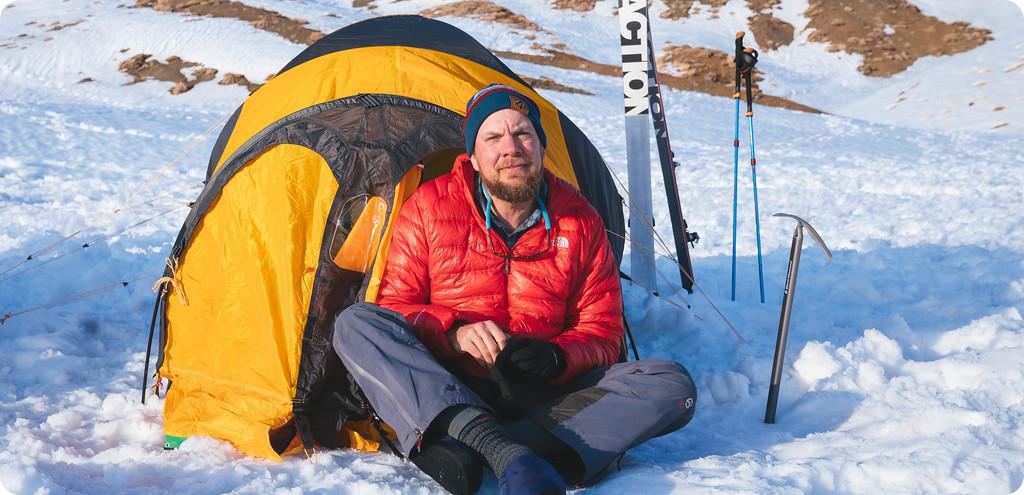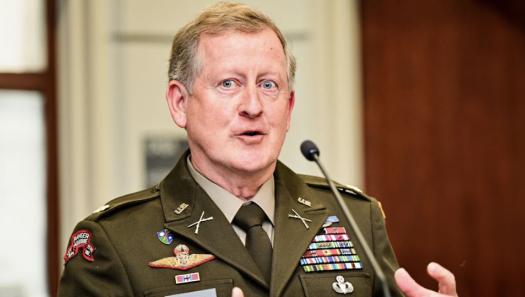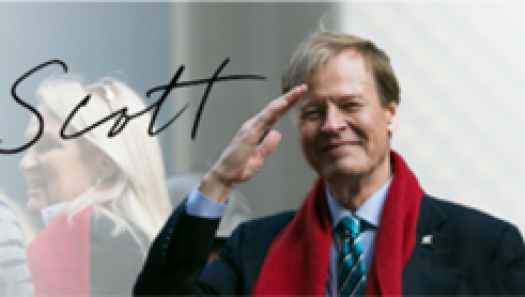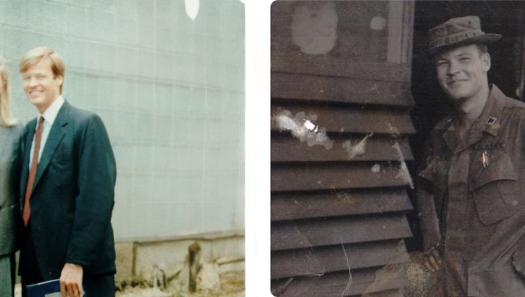Military & Veterans Life
After Combat, Time Outside Saved Army Veteran Stacy Bare's Life
Drew Higgins

“I credit time outside and rock climbing as saving my life,” said Stacy Bare, veteran and Director of Sierra Club Outdoors.
Bare, who served tours in Sarajevo and Iraq as a Captain in the U.S. Army, never doubted he would enlist. His uncle had been a green beret in Vietnam, and his grandfather, a Seabee in WWII. Raised in eastern South Dakota, Bare spent his childhood exploring Western and Midwestern landscapes, and learned the value of service early on, since “everyone had to pitch in” in his small town.
“There was no such thing as a single sport or single athlete kid. Everybody did a little bit of everything,” Bare said. He credits his willingness to try new things to that mentality.
Bare graduated ROTC with a Philosophy degree from the University of Mississippi in 2000, and was stationed in Germany. He deployed to Sarajevo for six months from 2003-04. After his tour, he worked clearing mines in Angola and Georgia with the humanitarian organization, The HALO Trust, until 2006, when he was recalled to Iraq.
Bare describes what he saw during his year-long deployment in Iraq as very “middle of the pack” in terms of tragedy. When he returned home, he didn’t think he should be hurting, because he hadn’t seen it “bad enough.” He struggled to reintegrate into civilian life, battling depression and substance abuse.
“I think the hardest part when you get out of the military, all of sudden, it’s like, ‘Where do I go? What do I do?” Bare said. “You can do whatever you want, and that can be really scary and overwhelming.”
Bare felt he had two options: either commit suicide or rejoin the army—and told as much to a friend.
His friend’s suggestion? Come rock climbing.
Bare agreed. But only because his buddy phrased it as, “Let’s have an adventure,” not, “Let’s go out to heal”—which is, of course, what happened. Clutching onto a rock face, hanging by a rope, Bare was a novice again. He was experiencing new challenges that necessitated vulnerability. As a six-foot-seven male, he was unaccustomed to asking for help.
“Because I’m a big tough veteran and I’m a big tough guy, I was like, ‘Nothing’s wrong with me, there’s something with everybody else, not me,’” Bare said. “Through time outside, I realized it was OK to ask for help, and it was OK to go to the doctor, and it is OK to be frustrated, to be angry.”

Adventure outside replicated positive attributes of military service for Bare, like camaraderie, perseverance and leadership skills. It also presented a fresh opportunity to form his identity beyond the military.
“There are thousand different ways for veterans to continue to serve,” Bare said. His became helping other veterans and individuals experience the same healing, benefits, and sense of purpose, as he has in the outdoors.
In 2010, Bare and fellow veteran Nick Watson, founded Veterans Expeditions (VetEx) a Colorado-based nonprofit that seeks to address the unique struggles and needs of veterans through time outside, on expeditions led by other veterans. The following year, he accepted a job at Sierra Club Outdoors as the Military and Veterans Affairs Coordinator. By 2012, he was Director of all of Sierra Club Outdoors. The nonprofit provides over 250,000 individual outing opportunities in the U.S. every year.
As Director, Bare no longer works exclusively with the military. But he views the ability for the outdoors to heal trauma, and trauma itself, to be universal.
“How we got our trauma and why we suffer might be unique and oftentimes, is, and that deserves some special attention,” he said. “But that we suffer and that we have trauma… Those are not unique.”
As it was for Bare, the outdoors offers a pathway towards creating a new identity in the aftermath of trauma. “One of the things we’re looking to do when we take people out is to build onto identity, to help individuals shape it how they choose to shape it. To tell their story how they choose to tell it. Not to have somebody else dictate to them their story, and how that story is going to end.”
He has been investigating how time outside can be integrated into traditional prescriptive medicine and working to create more robust research around the healing power of nature. “The San Diego V.A. just started prescribing surfing. How do we get every V.A., every hospital, every insurance system, prescribing time outside?” Bare asked.
Time outside can heal not only individual wounds but collective as well. In an age of divisiveness, nature creates commonality between people of disparate backgrounds and beliefs, in part because the forces of nature don’t discriminate--the same rain falls on all shoulders, according to Bare. When people sit around a campfire after a rigorous day outdoors, they are “much more interested in figuring out their common humanity” than their differences. Bare commented that he would love to get all five-hundred members of Congress out on trips.
“Right now, when we're stuck behind screens and we're stuck in boxes and we're stuck in offices, it's a lot easier to read something and yell back at it, or send an e-mail and press send and let it make its ripples without having to actually talk to one another,” Bare said. “A lot of veterans feel isolated, but gosh, a lot of people feel isolated. If we could just find a way to help each other out a little bit in the real world, face to face, analog... We'd be doing a lot better.”
In this vein, Bare began to wonder if the outdoors could also build bridges across cultural and global divides. When he first re-entered civilian life and began to share his story of service, “A lot of the time, people would respond very negatively about a country and the people in a country, like Iraq for example,” Bare said.
His own experience with locals from those countries had been just the opposite. He began to ask: “What can I do as a service member, as a veteran, to help share a different story to people?” as well as the question, “What can I do to, somewhat selfishly, to find peace?” He wondered what it would look like to return to the countries where had served, whether at war or after war, to ski and climb. Maybe, he thought, he could create a new narrative for himself and for others, with those places and people, centered around the landscape and adventure.
Out of this questioning came the multi-county, multi-year initiative, Adventure Not War (ANW). As part of ANW, Bare returned to climb in Angola in 215 with professional rock climber Alex Honnold and Vice Sports. In 2016, he traveled with three U.S. veterans to make a winter ski ascent of Mt. Halgurd, the second highest mountain in Iraq, documented in a film by The North Face.
“I wanted to make sure I rewrote a different ending for myself in Iraq,” Bare says in the film, which presents Iraqi culture and people alongside expeditionary components. “How many wars can we avoid entirely, because we’ve also built up these bridges of cultural understanding?” Bare asks.
ANW has released a longer film (below) about the Iraqi trip. Right now, Bare has his brain on the upcoming ANW projects—Bosnia, Georgia, and Afghanistan—and conversely, on winding down projects, so he can spend more time with his daughter and family. But he remains committed to helping people “find beauty and passion and love” in connecting to the outdoors and each other.
“Since we’ve been at war, it's been a pretty painful time for a lot of Americans, regardless of whether they have been to war or not. We need to figure out how to start healing those wounds and not just move beyond,” Bare said. “I think it's the challenge that veterans are hopefully uniquely situated to help lead on.”


